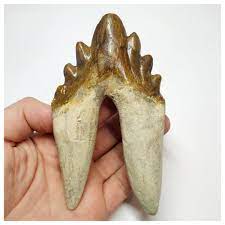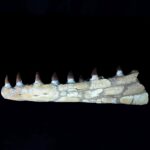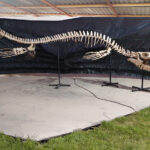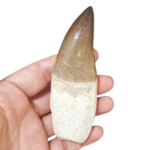
Basilosaurus is a genus of ancient whale that lived during the Eocene epoch, approximately 40 to 34 million years ago. Despite its name, Basilosaurus is not a true reptile, but rather an early ancestor of modern whales. Fossils of Basilosaurus have been found in various locations around the world, including North Africa, particularly in Egypt and Morocco.
Basilosaurus teeth are notable for their size and shape. They are conical, sharply pointed, and often curved, resembling the teeth of modern predatory mammals. Basilosaurus teeth were well-suited for catching and gripping slippery prey such as fish and other marine animals.
In Morocco, Basilosaurus fossils, including teeth, have been discovered in marine sedimentary deposits. The Kem Kem Beds formation, known for its rich fossil fauna from the Late Cretaceous and Early Cenozoic periods, has yielded numerous Basilosaurus specimens.
Basilosaurus teeth are highly valued by collectors and researchers for their scientific significance and rarity. They provide valuable insights into the evolution and paleobiology of early whales and the marine ecosystems they inhabited millions of years ago.











































